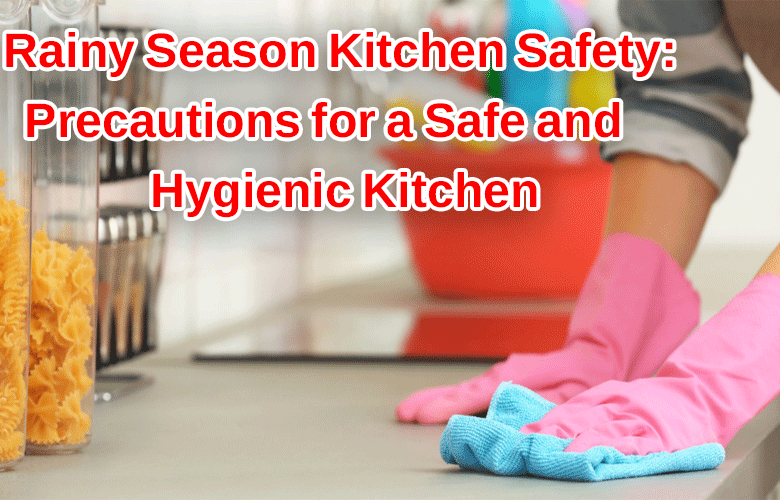The rainy season brings with it a delightful change in the weather, but it also presents challenges for maintaining a safe and hygienic kitchen. Increased humidity and water-related issues can create an environment that is conducive to mold growth, pests, and accidents. To ensure that your kitchen remains a safe and pleasant space during the rainy season, it is essential to take certain precautions. In this article, we will discuss important kitchen safety measures that will help you navigate the rainy season with ease.
Keep the Kitchen Dry and Well-Ventilated:
One of the primary concerns during the rainy season is excess moisture in the kitchen. Check for leaks and fix them promptly to prevent water from seeping into the kitchen. Use exhaust fans or open windows to improve ventilation and reduce humidity. Keeping the kitchen dry will help prevent mold and mildew growth, which can adversely affect the health of your family.
Store Food Properly:
The rainy season can cause food to spoil quickly due to increased humidity. Ensure that all perishable items such as fruits, vegetables, and grains are stored in airtight containers. Keep these containers in cool, dry places to extend the shelf life of your food items. Additionally, regularly inspect the pantry to remove any expired or spoiled food items.
Practice Kitchen Hygiene:
Maintaining cleanliness and hygiene in the kitchen is crucial during the rainy season. Clean the countertops, utensils, and appliances regularly with mild disinfectants. Pay special attention to areas that are prone to moisture, such as the sink area and refrigerator. Regular cleaning will prevent the growth of harmful bacteria and keep your kitchen safe for food preparation.
Pest control Measures:
The rainy season attracts pests seeking shelter and food. To prevent infestations, keep the kitchen free from crumbs and spills, and promptly dispose of kitchen waste in sealed bins. Consider using natural pest repellents like neem leaves or cloves to keep insects and pests at bay.
Electrical Safety Precautions:
Water and electricity are a dangerous combination. Avoid using electrical appliances with wet hands and ensure that all electrical outlets and switches are dry and well-insulated. During the rainy season, power fluctuations are common, so avoid overloading electrical sockets to prevent short circuits and electrical hazards.
Inspect Gas Connections and Appliance:
Gas leaks can pose a significant risk in the kitchen. Regularly inspect gas connections and appliances for leaks or damages. If you detect any gas leaks, shut off the gas supply immediately and seek professional assistance for repairs. Always use a gas stove in a well-ventilated area to prevent the buildup of gas fumes.
Food Safety Measures:
During the rainy season, waterborne diseases can be a concern. Avoid consuming raw or half-cooked food, especially seafood, as it is more susceptible to contamination during this season. Always wash fruits and vegetables thoroughly with clean water before consumption.
Conclusion:
By taking these essential precautions, you can ensure that your kitchen remains a safe and hygienic space during the rainy season. From keeping your kitchen dry and well-ventilated to practicing proper food storage and hygiene, these measures will help you navigate the challenges of the rainy season with confidence. Prioritizing kitchen safety will not only protect your family from health risks but also enhance the overall joy of cooking and spending time in your kitchen during this delightful season.
